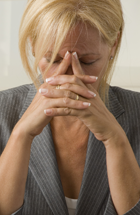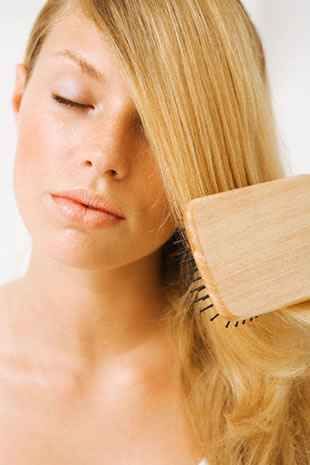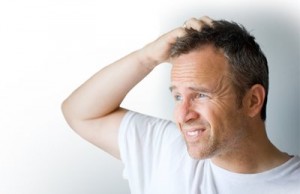Stress related hair loss.
22.10.2009 in Uncategorized
Stress has been identified as a cause of hair loss in both men and women. Stress related hair loss is often temporary and may not be noticed until the stressful period has passed. This is because of how stress affects the hair growth pattern, which is explained below.
Hair follicles grow in cycles, which are broken down into three phases, the Anagen or growth phase, the Catagen or transitional phase and the Telogen or resting phase.
In a health hair cycle, the majority of hair grows during the Anagen phase. This can last between two and six years, and hair grows approximately 10cm a year. The Catagen phase lasts about one or two weeks and during this phase the hair follicle shrinks to about 1/6 of the normal length and the lower part is destroyed. Finally during the Telogen phase, which lasts around 5-6 weeks, the hair does not grow but stays attached to the follicle. Approximately 10-15 % of all hairs are in this phase at once.
At the end of the Telogen phase the hair follicle re-enters phase one and a new hair begins to form. If the old hair has not already fallen or been brushed out, the new one pushes it out and the process begins again.
When a person is under stress, their body can produce chemicals, which cause the hair follicles to enter the Telogen phase. This means that for the following few months, the hair continues to fall as usual but no new growth takes place. This results in a thinner looking head of hair and eventual hair loss.
Once the stressful period has passed, the hair will usually re-enter the Anagen phase, where new growth occurs. However sometimes the individual will find the hair loss itself extremely stressful, particularly in cases of women’s hair loss. This new stress, can lead to the production of more chemicals that further disrupt the hair cycle.
Whilst stress related hair loss can be caused by extreme periods of trauma, such as the break-up of a primary relationship, or the death of a loved one, it can also be caused by chronic low level stress. Whatever the type of stress you are under, it will help if you learn more about the causes of it and practise techniques to manage it.
Stress related hair loss – contact us now for a free consultation 0207 976 8686
What is stress?
Stress is the term used to describe the physical and emotional strain on the body caused by a person’s response to pressures from the outside world. A certain amount of stress is positive and helps a person feel motivated and stimulated by life. However when a person is under too much pressure, whether that is because of too many demands on their time or because of internal worries, it can lead to a decline in physical health, problems in their relationships and a reduced enjoyment of life.
Stress causes a range of physical, mental and emotional symptoms and these vary from person to person. Some examples include headaches, tense muscles, frequent minor illnesses, stomach upsets and IBS, panic attacks, palpitations, sleeping problems, irritability, tearfulness, withdrawal from socialising, sleep problems and tiredness.
Stress can be caused by external and internal factors. External factors can include things such as money worries, problems at work or difficulties with neighbours. Sometimes these stressors can be eliminated by making life changes. However often a person cannot for example move or change jobs immediately, so relief must be sought through stress management techniques, whilst plans for the future are made.
Internal stressors come from the way a person perceives a situation. These can be harder to change and control as they are often deeply ingrained. Examples of internal stressors include worries over not being good enough, body and appearance issues and feeling frustrated by life. These are best dealt with through personal development techniques and working with a trained counsellor.
There are many things you can do to manage your stress better.
Make time each day to relax and do something you enjoy. This will give you time to unwind and take a break from your problems.
Take regular gentle exercise. This helps to relieve stress and release pent up emotions.
Talk through problems with a friend or a trained counsellor. This can help you find solutions to the things that are worrying you.
Learn meditation or listen to relaxation CDs. These will give your tired mind a rest and may help you feel more positive.
Do you have Hair Loss Problems, read our Hair Loss Help










